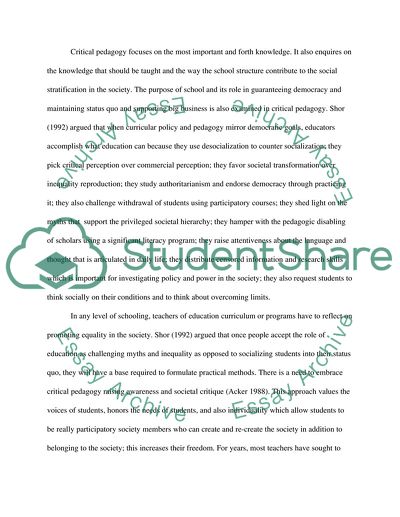Cite this document
(Critical Pedagogy Movement Essay Example | Topics and Well Written Essays - 1750 words, n.d.)
Critical Pedagogy Movement Essay Example | Topics and Well Written Essays - 1750 words. Retrieved from https://studentshare.org/education/1762016-drawing-on-perspectives-from-the-critical-pedagogy-movement-examine-the-contention-that-education-can-be-both-a-vehicle-for-maintaining-the-status-quo-and-a-force-for-social-change-1750-words-approx
Critical Pedagogy Movement Essay Example | Topics and Well Written Essays - 1750 words. Retrieved from https://studentshare.org/education/1762016-drawing-on-perspectives-from-the-critical-pedagogy-movement-examine-the-contention-that-education-can-be-both-a-vehicle-for-maintaining-the-status-quo-and-a-force-for-social-change-1750-words-approx
(Critical Pedagogy Movement Essay Example | Topics and Well Written Essays - 1750 Words)
Critical Pedagogy Movement Essay Example | Topics and Well Written Essays - 1750 Words. https://studentshare.org/education/1762016-drawing-on-perspectives-from-the-critical-pedagogy-movement-examine-the-contention-that-education-can-be-both-a-vehicle-for-maintaining-the-status-quo-and-a-force-for-social-change-1750-words-approx.
Critical Pedagogy Movement Essay Example | Topics and Well Written Essays - 1750 Words. https://studentshare.org/education/1762016-drawing-on-perspectives-from-the-critical-pedagogy-movement-examine-the-contention-that-education-can-be-both-a-vehicle-for-maintaining-the-status-quo-and-a-force-for-social-change-1750-words-approx.
“Critical Pedagogy Movement Essay Example | Topics and Well Written Essays - 1750 Words”, n.d. https://studentshare.org/education/1762016-drawing-on-perspectives-from-the-critical-pedagogy-movement-examine-the-contention-that-education-can-be-both-a-vehicle-for-maintaining-the-status-quo-and-a-force-for-social-change-1750-words-approx.


